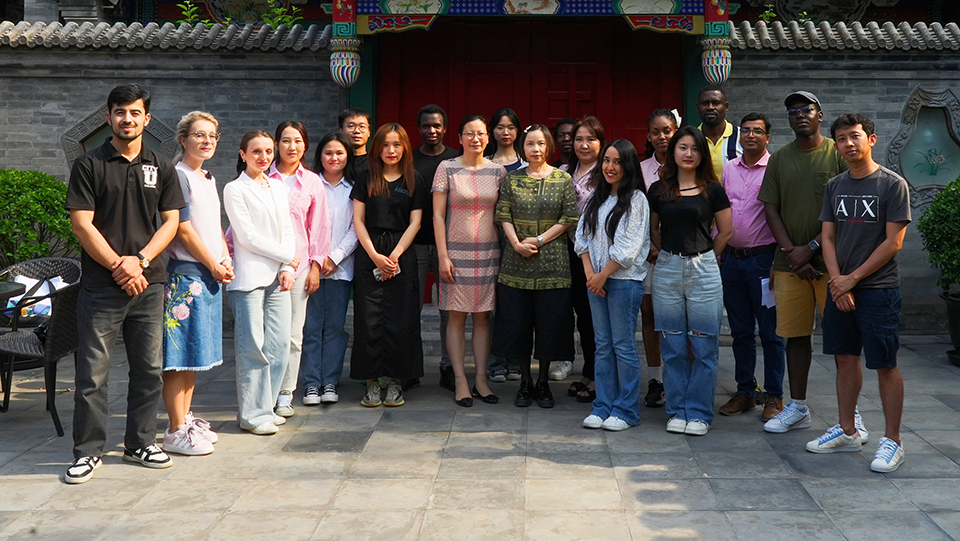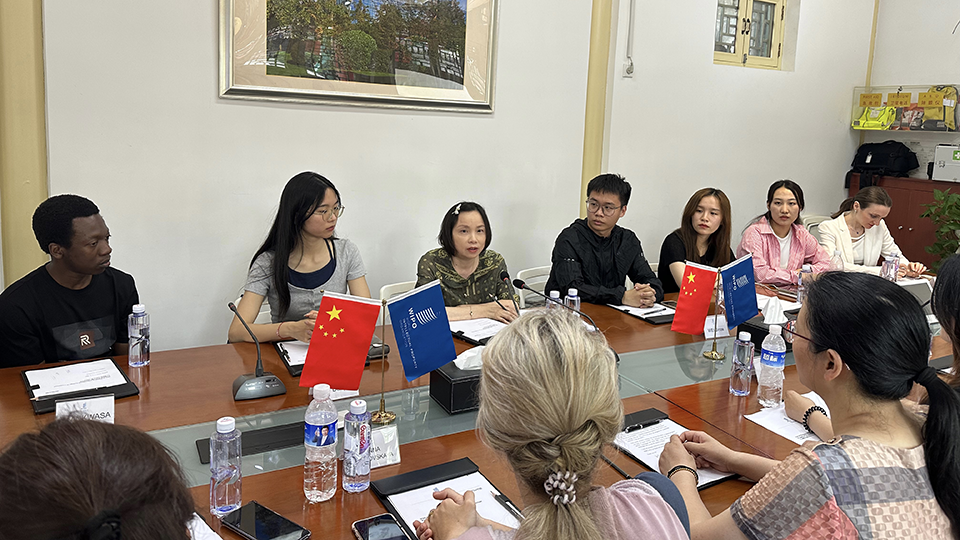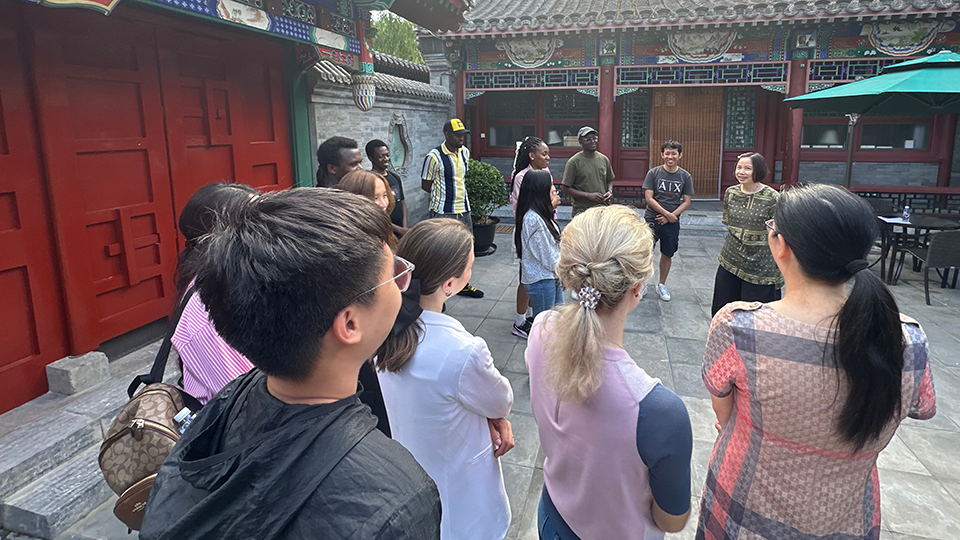WIPO China: Fostering Global IP Talent and Exploring Future Trends
June 28, 2024
June 14, Beijing - The World Intellectual Property Organization (WIPO) Office in China welcomed 21 faculty members and students from the Shanghai International College of Intellectual Property at Tongji University, including those participating in the WIPO-Tongji Joint Master's Program and the Belt and Road Initiative project. The students hailed from 13 countries including Cambodia, Iran, Tanzania, Bangladesh, Georgia, Mongolia, China, Uganda, South Africa, Cameroon, Tajikistan, Zimbabwe and Russia. Ms. Liu Hua, Director of the WIPO Office in China, engaged in discussion with them.

Ms. Liu Hua introduced the new trends in global innovation and IP development. She noted that the world is undergoing unprecedented changes. The "Digital Age" innovation wave based on artificial intelligence, blockchain, cloud computing, and big data, along with the "Deep Science" innovation wave built on biotechnology and nanotechnology, are profoundly transforming the way we work, live and play. There are three major new trends in the global innovation landscape: the eastward shift of innovation centers, enhanced exchanges and collaborations, and enterprise-driven innovation.
WIPO is actively addressing the impact of frontier technologies on the future global IP system. Since 2019, the "WIPO Conversation on IP and Frontier Technologies" focusing on AI, big data, and the metaverse, has provided an open, inclusive forum to facilitate discussion on the impact on IP of frontier technologies, including AI. To date, nine sessions have been held. The ninth session, held in March this year, focused on "Training Machines – Bytes, Rights and Copyright Conundrum". Participants believed that beyond government regulatory frameworks, autonomous practices by industry entities such as tech companies and creators can provide public wisdom and social impetus for data governance. Policy responses should be inclusive and diverse, not only focusing on the interests of major countries and tech giants but also ensuring that technological progress benefits everyone.
Ms. Liu Hua also shared WIPO's new initiatives in embracing AI, including developing and providing AI-powered services and tools such as WIPO IP Diagnosis to assist users and stakeholders, to enhance efficiency, accuracy, and accessibility in relevant work of intellectual property. She emphasized that young students need to embrace changes actively, be proficient in new technologies like artificial intelligence and big data and pay close attention to developments in IP management, cultivating critical thinking and teamwork spirit to stay at the forefront of innovation.

Ms. Liu Hua pointed out that WIPO leads the development of international treaties in the field of intellectual property to ensure that the intellectual property system can comprehensively adapt to the needs of global development. For example, on May 24 this year, WIPO concluded the WIPO Treaty on Intellectual Property, Genetic Resources and Associated Traditional Knowledge, the first WIPO Treaty to address the interface between intellectual property, genetic resources and traditional knowledge. It is also the first WIPO Treaty to include provisions specifically for Indigenous Peoples as well as local communities. Once it enters into force with 15 contracting parties, will establish in international law a new disclosure requirement for patent applicants whose inventions are based on genetic resources and/or associated traditional knowledge.
Ms. Liu Hua also mentioned the Diplomatic Conference on the Design Law Treaty, scheduled to take place in Saudi Arabia this November. The future treaty aims to streamline the global system for protecting industrial designs, making it easier, faster and more affordable for designers to protect their work in home markets as well as overseas.
Students from SICIP shared their learning and practice experiences in the IP field. They acknowledged the driving force of IP in innovation and expressed their aspirations to further their studies, practice, and contributions in the field in the future. Ngouwouo Abdel Ibrahim from Cameroon talked about his experience working with the African Intellectual Property Organization (OAPI) and his hope to gain deeper insights into international IP cooperation and governance. Thobakgale Judith from South Africa mentioned her participation in WIPO's development policy course in 2023 and expressed her desire to intern at WIPO to gain more international IP experience.
Wang Tingxuan, a student in the WIPO-Tongji joint Master's program, has an undergraduate background in German and Computer Science. She believes that her previous studies have provided her with different perspectives on IP issues and she looks forward to further in-depth research and development in the IP field. Talebi Lemraski Fatemeh Zahra from Iran firstly started her IP journey through WIPO's Summer School in 2021. She is currently a volunteer in an organization related to women in international trade and hopes to gain opportunities to work in the field of IP in China in the future. Vong Chanraksa worked for the Ministry of Economic and Finance of Cambodia as a contractual government official before coming to China. He expressed his gratitude for the scholarship offered by WIPO for the WIPO-Tongji Joint Master’s Program.
During the interactive session, Talebi Lemraski Fatemeh Zahra inquired about how WIPO reconciles differences in national IP policies, while Anna Pokrovskaya from Russia focused on data security issues in WIPO's AI tools development and whether AI models would replace human labor. She also asked about WIPO’s summer school programs in other regions and countries.
Ms. Liu Hua responded by stating that although countries have different paces of development in the IP field, WIPO places great importance on promoting balanced IP development across nations. WIPO provides training and capacity-building programs to its member states and partners to help them establish and develop effective IP systems. She also provided a detailed overview of WIPO’s services and resources, including policy forums, registration systems, databases, cooperation platforms, and capacity-building. She emphasized that while technological advancements may lead to profound changes, there is no need to worry excessively about AI completely substituting human labor. Technological progress has always been a part of human society and history, and rather than reducing job opportunities, it has created more emerging opportunities.

This visit not only enhanced the students' understanding of key IP knowledge but also inspired their awareness of addressing societal challenges and improving innovation capabilities. The students expressed their aspiration to become experts in this field and contribute to national development and international cooperation.